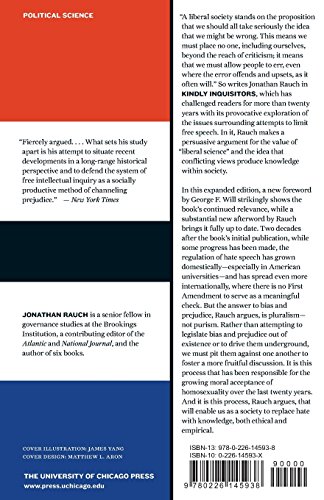



Kindly Inquisitors: The New Attacks on Free Thought
A**U
Challenging and beautiful; the long game for those interested in social change
This magnificent piece of writing is a potential balm for campuses that seem to be divided along ideological lines, and is a must-read for students and professors interested in making the very most out of the potential of university educational experiences. The book is both compassionate and edgy, delving without apology into the humanitarian and egalitarian principles that support the seemingly humane circumscription of expression of thought on campus. The author then provides an unblinking and foreword-thinking observation of the end to which attempts to maintain the ideals of political correctness in the university lead: creed and culture wars. Throughout the book the author makes a convincing case for a strength-based and affirming solution that serious thinkers from across the ideological spectrum will be able to live with, and with practice and discipline, enact. This is a book about the long game of advocacy that students in a post-Orlando world need to read.This is a book for our times, written by a gay man who is a gay rights activist, and who has lived to witness both intense oppression and inspiring social change. He clearly outlines a set of strength-based and ideologically neutral principles for advocacy and social change, while also providing a well-reasoned and straightforward description of the pitfalls into which those of us who care deeply about people may fall in misguided, and ultimately destructive, endeavors to promote sensitivity in the university. What Rauch has to say is challenging and beautiful.For professors who are considering using this book (I am assigning it for my graduate-level human development class next fall) I suggest having students read the last chapter first, and I also suggest having students watch the utube interviews with Rauch early in the class (his gentleness and genuine care for others is more apparent in the last chapter and the interviews than it is in the initial chapters of the book, and knowing the author better may help cautious students to engage with some challenging material).
D**R
As a conservative, I recommend this book
As a conservative, I don't agree with every political position discussed in the book, but Jonathan Rauch does an excellent job of relating the success or failure of every political position back to free speech. The book is one of the more coherent books I have read. Every word contributes to the subject that is the title of this book.Rauch argues that when there is free speech, civil liberties expand. When speech is censored and suppressed, civil liberties shrink. Currently, the postmodernists and neo-Marxists (but I repeat myself) advocate for censoring speech. They don't stop there. These tyrants want to cancel anyone that doesn't tow the Leftist social justice line. This book was written in 1993... well before the 2020 "mostly" peaceful protests that included murder, burning, rioting, looting, and general vandalism.... well before the Tech Tyrants began censoring speech.This book is more relevant today than it was in 1993. I recommend every one of every political persuasion read this book.
I**R
Too many words
Jonathan Rauch is an excellent writer, and I am definitely part of the choir for his argument that speech restrictions, especially on college campuses, are a perversion not just of the ostensible purposes of our colleges, but of any kind of liberal or scientific thought.Despite my agreement with his arguments, I gave this book only 3 stars because I felt that it provided me with little new information, and would have no effect on those who are urging "speech codes". As I read, I kept thinking of Amadeus, when the Emperor explained to Mozart what was wrong with his latest composition: "Too many notes." In this, too many words. The problem is that those who favor "speech codes" have long since concluded that theirs is the only right view, and that those who feel otherwise are either evil, or stupid, or both. Or, as Rauch says, are latter-day Fundamentalists, with whom it is pointless to argue, Try reading the lonely one-star review for a reasoned rebuttal to Rauch's thesis. So what's the value of a long intellectual argument?Nor is this anything new. As Nat Hentoff noted in "Free Speech for Me, but Not for Thee", written just over 20 years ago, both Left and Right have been trying to censor the other side for years. And universities have long been known for their leftish bias. Many years ago, when I was in college, official censorship was not yet in vogue, but even the least perceptive of students was careful in what he said in class, or wrote as an exam answer. All that has really changed is that the onslaught of "victimization" studies at the universities has provided an excuse for campus-wide censoring of Wrong Speech enforced by administrators who too well remember the fate of Larry Summers at Harvard..I think the reason for the book's length is Rauch's effort to make censorship a denial of the scientific method, under which all views of things are subject to constant criticism and question, out of which further enlightenment comes. I would agree in general, although his reliance on the intellectual community to detect error doesn't, in my view, give enough weight to the non-scientific incentives that seem to be skewing some allegedly dispassionate researchers, and the failures of "peer review." More importantly, anyone who believes a little censorship is a good thing is unlikely to persuaded by, or even pay attention to, arguments about the scientific method, which use up lot of space in this book..Whether it's good news or bad, the urge to censor speech with which those in power disagree is not new, dating back to Ancient Greece. The fight continues, but it is alarming to have the alleged intellectuals at our Universities join the Inquisition.
A**I
Highly relevant read for our times
If you didn't know it was written 28 years ago (original publication in 1993) you would never guess and say that it was written as a reaction to most recent events. It is also a little shocking to find that during those nearly three decades little has changed for the better when it comes to free speech. Actually, it seems to be getting worse. This is a very pleasant read that gave me a lot of interesting thought experiments to consider.
G**N
An antidote to the confusion of our times
This is a must read for anyone concerned with the attack on Western, enlightened values and rationality in the academy and beyond. It exposes the totally wrong-headed madness of the world we currently live in (at least in the first-world, democratic, Anglophone West). A wise and considered piece of writing. It gives sustenance to knuckle down and stay the course.
C**
Breathtakingly succinct. But missin letters?!
Exceeded expectations!The erosion of liberty began in my lifetime!Once I got thro' the 1st chapter expecting another tired but valid tirade on 'muh SJW's'The way the book dazilingly summerises extremly complex ideas to a gutsy case against groupthink that began in 1993 is staggering.One point, on print is strangly low qualit with ends of some words missin!
B**K
Still relevant after almost 40 years
The problems discussed in this book have only gotten worse since the book was first published. “Simple” principles are presented that should be applied to all discourse: no one gets the final say, no one has personal authority, words are not violence, no one is exempt from criticism, no one has a right to avoid being offended.The book goes through possible knowledge-producing systems and shows that the one used by “liberal science,” including soft sciences, should follow the above rules. The alternatives, the author argues, lead to tyranny.As we continue to be in societies that try to censor speech and punish offenders with the loss of their livelihoods (often with the excuse of “helping the oppressed”) we should take the author’s arguments to heart.Similarly, at our institutions of learning and education, anything presented as knowledge should be subject to public evaluation via the rules in this book.
R**A
A must read for anyone who really thinks about free speech
A an excellent read. The author discusses what he sees as the threats to this freedom, which are primarily fundamentalist and humanitarian. His discusion of these notions is compelling and well argued. But the author does not just leave us with what we should avoid if we really care about free speech but he also discusses the Importance of what he calls Liberal science. Why it works, how it works, and why we should not give up on it...
J**A
Explica con claridad las graves consecuencias de la "corrección política" sobre la sociedad liberal
El libro de Rauch es un clásico que ya tiene casi 30 años, pero su mensaje es totalmente actual. Explica con tremenda claridad las consecuencias de esta inquisición de lo políticamente correcto sobre la sociedad liberal. Hoy estamos viviendo mucho de lo que anunciaba Rauch, pero agravado. Vale la pena leerlo y es un placer hacerlo, ya que está muy bien escrito.
Trustpilot
5 days ago
4 days ago